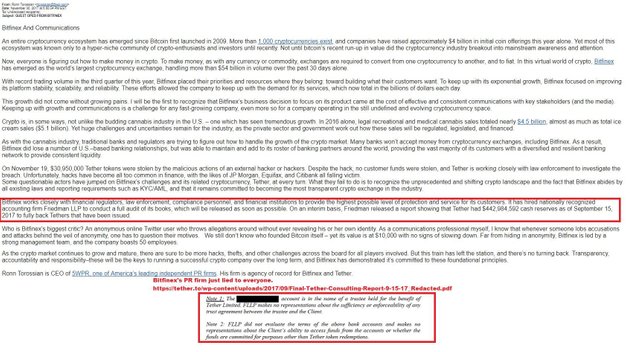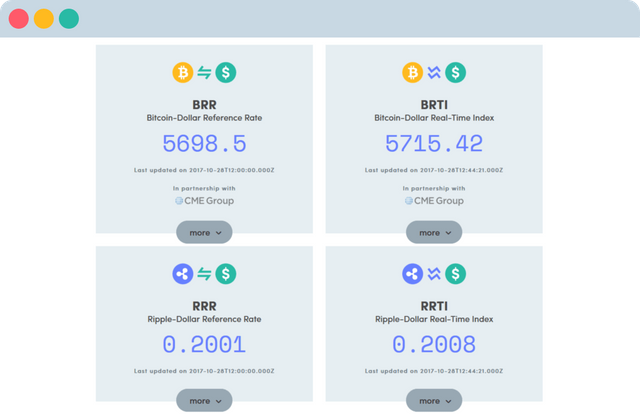Is it true that the house always wins? Why I'm bullish about Ripple and XRP.

Update: yes I am of some formatting inconsistencies; wordpress isn't playing nicely but it should be resolved soon.
Living at the bottom of a dam
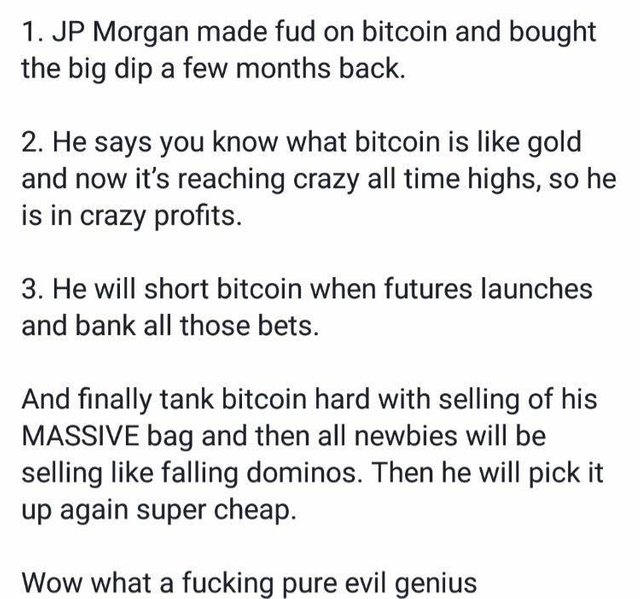
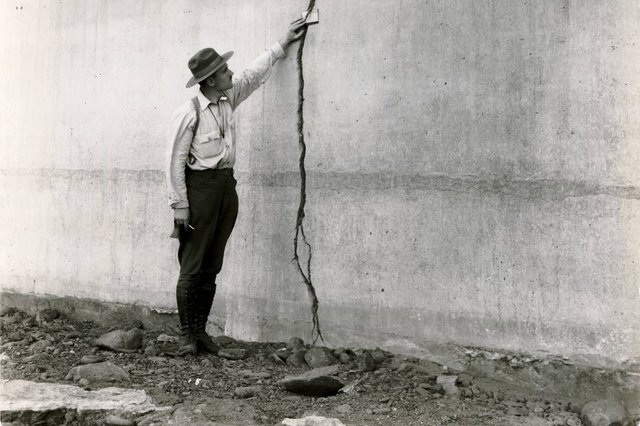
consider a narrow river valley below a high dam, such that if the dam burst, the resulting flood of water would drown people for a considerable distance downstream. When attitude pollsters ask people downstream of the dam how concerned they are about the dam's bursting, it's not surprising that fear of a dam burst is lowest far downstream, and increases among residents increasingly close to the dam. Surprisingly, though, after you get just a few miles below the dam, where fear of the dam's breaking is found to be highest, concern then falls off to zero as you approach closer to the dam! That is, the people living immediately under the dam, the ones most certain to be drowned in a dam burst, profess unconcern. That's because of psychological denial: the only way of preserving one's sanity while looking up every day at the dam is to deny the possibility that it could burst.
Would you have yourself believe that you didn't see the writing on the wall when the CME Futures were announced? Maybe even a little? The assumption is that people in the cryptocurrency speculation space, know so little about regulation of forex and stock markets that they assumed this libertarian neck-beard pseudo anarchist experiment wouldn't catch the eyes of actual sharks who have the liquidity and the expertise to come in and drain the market.
A market that is willing (in many peoples cases) to put everything on the line in order to get rich and get Lambo meme money is almost like shooting fish in a barrel for these guys.
Imagine being in your ivory tower at a major investment bank and looking out at the house of cards:
- An unregulated market
- Unregulated ICOs
- Exchanges that don't respond to tickets, support requests, crash during the most inopportune moments
- Tethers that are used in a manner akin to fractional reserve banking
- Bitcoin Core developers that are on the payroll of AXA and by proxy, Bilderberg
HE'S SHILLING BCASH!!

Nope, sorry; I'm not pumping or shilling Bitcoin Cash here. The perception and argument of BCH/BCC/BCash/BTrash - whatever you choose to call it, at-least for the moment is off the table. It's not even about the technology anymore. It's not about the technological differences, the difference in transaction times, the mempool, the miners, the fees; none of this matters for the moment. Bitcoin Cash has been manipulated just as much; and I don't believe it will be safe in the short term from being squeezed by Tether, Bitcoin maximalists and the ongoing smear campaign. Having said that, going long on Bitcoin Cash, in my view is a good idea. It is cheap right now, and it still does function as a p2p payment system with low fees and fast transactions. SBI Group Backs Bitcoin Cash to be “Used Globally For Daily Payments”. When the SBI Group makes such a statement, it should not be ignored. SBI BITS and nChain Announce Strategic Partnership to Support Cryptocurrency Security and Bitcoin Cash.
It's happened before
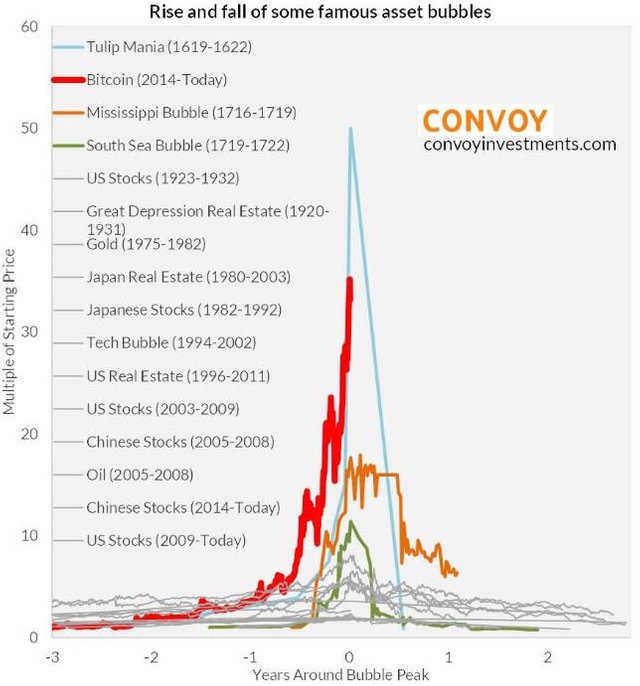
Let's ignore Bitcoin Cash for now. Leading up to the dot com bubble there was an environment that was incredibly similar to now. An increase of mania, FOMO (Fear of missing out), over-buying, lack of understanding of the underlying concepts, technologies and people using debt to fund speculation. Everyone had to have a website. Companies paid through the absolute nose for a web presence, and web developers made hand over fist. It was the job title everyone wanted. I remember at this time I was doing my first uni degree, and two subsequent diplomas in inter-network engineering & web and multimedia design and development. What a mouthful. By the time I was finished with the course work; the web development world had imploded and people were churning out templated websites for under $500. Under $250. Leading up to the silver bubble of 2010/2011 we saw the exact same thing. People were taking out debts, going all in, just to be part of the wave. The results were the same.
R vs K selection
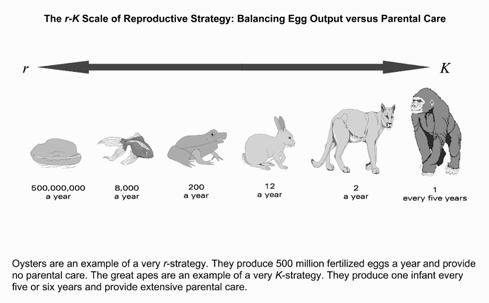
By contrast, K-selected species display traits associated with living at densities close to carrying capacity and typically are strong competitors in such crowded niches that invest more heavily in fewer offspring, each of which has a relatively high probability of surviving to adulthood (i.e., low r, high K). In scientific literature, r-selected species are occasionally referred to as "opportunistic" whereas K-selected species are described as "equilibrium".[8]As the name implies, r-selected species are those that emphasize high growth rates, typically exploit less-crowded ecological niches, and produce many offspring, each of which has a relatively low probability of surviving to adulthood (i.e., high r, low K).[8] A typical r species is the dandelion Taraxacum genus.
In unstable or unpredictable environments, r-selection predominates due to the ability to reproduce quickly. There is little advantage in adaptations that permit successful competition with other organisms, because the environment is likely to change again. Among the traits that are thought to characterize r-selection are high fecundity, small body size, early maturity onset, short generation time, and the ability to disperse offspring widely.
In stable or predictable environments, K-selection predominates as the ability to compete successfully for limited resources is crucial and populations of K-selected organisms typically are very constant in number and close to the maximum that the environment can bear (unlike r-selected populations, where population sizes can change much more rapidly).
Risk takers and speculators are running on R Selection. High risk, high return. Short term thinking, obfuscation of the facts and ignorance to the evidence.Long term investment into projects that have actual use case, premise, address an actual business issue, is a display of K Selection.
Are you a hypocrite?
Back on topic - No, I don't believe so. I am not writing this in a manner that contradicts my own previous statements. As you become aware to new information you should adopt your game plan. I think I've been quite forth coming with my articles and how I have derived my decisions and have provided sufficient evidence to both rationalise my position as well as provide a bedrock for you to conduct your own research and make your own conclusions.I am not concerned about my own liquidity. I do not have anything at risk. If cryptocurrency were to disappear tomorrow I would just loose the coins. My lifestyle would not change. I have diversified my portfolio and as such, apart from inconvenience, I couldn't care less if we go into a crypto winter. I would in fact welcome some amount of regulation and market control, despite being very much for open markets. The system is gamed and is not fair, it is being centrally controlled by a number of entities that I have alluded to already in previous posts.I have strategically positioned my portfolio to be aggressive in such a world. I do believe significant change is coming. I have been reading the documents provided by BIS Basel, by the governments of numerous first world countries and it has in many ways influenced my long term strategy.Setting the stage for regulation, taxation, law enforcement et al
What if this experiment has been graceful modified into a beautifully orchestrated, hijacked and co-opted way of shifting money from the populace into the pockets of wall street bankers, willingly? What if this is a wonderful opportunity to do so in a manner without any government oversight, no rules, no law enforcement, no commissions, no legality issues, just a straight "gibs me dat" that prays on the naivety of speculators.I keep seeing an ongoing push of "be your own bank!" "fuck the bankers!" "BITTTTCCCOOINNNN!!!" when these people are blissfully unaware of the true extent of existing columns of power and wealth that have penetrated the crypto currency space to drain them of their money. Yes, there are people who are getting rich and are in profit - I am one of them, but I feel that I am one of the few (comparatively) that at least has my eyes partly open to the writing on the wall.Regardless of the future for Bitcoin, it's becoming exceedingly obvious to me that it is failing at delivering its core premise. A fast, cheap and stable cryptocurrency that provides a viable replacement to existing fiat and is able to scale to handle the demands of more than a relative handful of libertarians who want to say "fuck you!" to the system. I doubt that the majority have even read the Bitcoin Whitepaper, or understand what it represents. Even the postulation of 'store of value' doesn't sit right with me. When ebs and flows are swinging as they are; it will be some time before this becomes an honest and truthful premise that is actually reflective in the stability of the value of Bitcoin.ICO's are nothing more, in my opinion, than speculative Kick-starter Programs with 0 regulatory enforcement, obligations, compliance requirements. It is often straight out theft, powered by greed on the off chance that you will make money on the other end. So far, I'm really hard pressed to find a single recent ICO that has gone to market that has produced anything tangible yet the values of the tokens are skyrocketing.None of the major cryptocurrencies have proven to be actually scalable to the point of being able to be used on a daily basis. Ethereum, IOTA, Bitcoin - all of which have shown incredible amounts of lack of resilience, scability, usability, and often security to make them a viable alternative to existing currency. And yes, I know, we're still in the early days of this journey relatively speaking and we need time to iron things out. But having had experience on a number of large scale projects I just get the feeling that the cart is leading the horse and things have been released to production too early. Nobody is really asking questions because we're all making money. But how will it play out long term?I have talked about Tether and Exchange Solvency enough already; so I won't drum beat that topic too much - but it's part of the overall context of what is coming in my view. At some point, there is going to be a inquiry into and auditing of, the operation, solvency and policy to which these exchanges have been operating. There seems to be too many coincidences. From accounts full of coins being locked out from their owners, to lack of audit trails, lack of transparency, coincidental outages during times of massive price movements, missing data and more. Guess who controls over half a billion Tethers across 3 exchanges—over 73% of USDT currently in circulation.We can keep rehashing the very plausible idea that we're building a huge amount of speculation on top of a house of cards.
Of interest; the CME Cryptofacilities Platform indices are only using BTC and XRP. Look at the spread. With the stability of XRP and it's speed; is it a way to ingress/outgress large sums of capital / profits without waiting for the mempool and knowing that the transaction will be fast and cheap enough that your profits will not be eaten up by the volatility of the market?Speaking of CME - this is what people will be up against. "Old hodlers and crypto-veterans will eat up wall street" - I'm not so sure.
A thriller about a genius algorithm builder who dared to stand up against Wall Street. Haim Bodek, aka The Algo Arms Dealer. After Quants: the Alchemists of Wall Street and Money & Speed: Inside the Black Box. This is the final episode of a trilogy in search of the winners and losers of the tech revolution on Wall Street. Trading on the financial market is not longer dominated by humans, but by super fast computers and algorithms. The result of this digital revolution on Wall Street is a complex and fragmented financial system that is hard to understand and overseen. A system that we are all connected to. The only people who understand the system a bit, are the people who built it. Haim Bodek started his own high frequency trading in 2007 and built a from his point of view perfect and fast algorithm. One day it just stopped working. Profits disappeared en he went looking for the cause. He decided to go public with his search to display the rotten system.But let's move onto what I think will happen.How it could go down
It's could go down something like this:Of interest, if you follow Bitcoin Core and the implementation of Lightning Network; it really seems that the following will occur.
- The market is going to suffer a massive correction, either because of, or in part due to;
- Exposure of Exchange Solvency or lack there of
- Audit of Exchanges
- Exposure of the true nature of tethers
- Corrective pressure due to regulatory and compliance action
- In the event of a run for the doors, class action against exchanges, or other market place issues
- Super rich and highly experienced traders demolish the market with futures and/or traditionally immoral, unacceptable and illegal practices since the market is current unregulated.
- People loose alot of money, feel cheated, and run to the governments of their respective countries demanding regulation.
- Government imposes legislation and regulatory compliance on exchanges, citizens, cryptocurrency projects etc
- Or, they just beat us to the gun and do it ahead of time.
- oh wait they did: BITCOIN EXCHANGES IN AUSTRALIA WILL HAVE TO REGISTER WITH THE GOVERNMENT
Meanwhile, across the pond:
- Lightning Network will create hubs, which will transfer funds from one party to another.
- This falls into IRS's definition of "third party settlement organization": https://www.irs.gov/payments/third-party-network-transactions-faqs
- As such, IRS requires these to report the transactions.
- So, who will be willing to be a Lightning Hub and report to the IRS? Most likely only banks or large exchanges, which are subject to KYC and AML regulations.
- Expect other countries to follow
The House Always Wins
So further to Korea, Japan and USA bringing in legislation changes and regulatory changes especially in the ICO space; but in cryptocurrency in general, what am I going to do?I began researching and investigating all of the cryptocurrencies that were within the top 15 and seeing if they would fit into a decision matrix.
I am willing to delay gratification for the sake of sustained and significant gains.
Found it.
- Is the project and the currency compliant with the future of regulation and compliance as I believe it will exist. - Below
- Is the project backed by a significant team, with credentials and experience that is searchable.
- Ripple Leadership
- With offices in San Francisco, New York, London, Sydney, India, Singapore and Luxembourg, Ripple has more than 100 customers around the world.
- Is the project already operating, and has tangible products.
- Apart from XRP
- Process Payments xCurrent
- Source Liquidity xRapid
- Send Payments xVia
- Is the project addressing a business requirement in the market today and Is the project addressing a specific niche and use case scenario.
- Ripple provides one frictionless experience to send money globally using the power of blockchain. By joining Ripple’s growing, global network, financial institutions can process their customers’ payments anywhere in the world instantly, reliably and cost-effectively. Banks and payment providers can use the digital asset XRP to further reduce their costs and access new markets.
- Use Cases
- Is the project scalable and able to handle significant transaction counts.
- Is the project resilient to change over time and able to be updated without issue.
- XRP is controlled by Ripple. They can stage forks and performance upgrades (and have done on a significant amount of occasions) in a manner that does not interrupt production nor subjective to ideological differences in consensus (Bitcoin v Bitcoin Cash)
- Is the project resistant to impact from Green Policy, Eco-Terrorism and other changes in the Energy Space.
- XRP does not require costly and power inefficient mining. It is pre-mined.
- Understand consensus on the XRP Ledger
The teenage investor sums up my thoughts perfectly:
Why People Aren't Investing in XRP, irrationalities of the crypto market
<iframe src="
What is Ripple(XRP)? Ripple(XRP) Explained For Beginners
<iframe src="The Ripple Roadmap in a nutshell. Thanks to https://www.reddit.com/user/Slajso
Step 1) Get as many banks and institutions to use RippleNET. No XRP yet.
Step 2) Wait for whole regulation
Step 3) Keep accumulating banks and such
Step 4) Regulation hits, banks/institutions now fear nothing
Step 5) Tell ALL of your users (which you've been accumulating for so long) that if they all get use XRP, they will SAVE EVEN MORE money
Step 6) Watch them accept as it benefits everyone
Step 7) People catch on and start buying as well.
Step 8) Profit
MUST READ: Session with Stefan Thomas - CTO at Ripple
XRP and Ripple are not linkedXRP and RippleNet are not bound together, but the entire purpose for using XRP is ingrained to the system. Yes they can use anything they want, but the incentive is not there.
Here's the scenario:
Alright, so Bank A wants to send $100,000 to Bank B. Here's how that works
With XRP:
- Bank A uses RippleNet to instantly convert fiat to $100,000 worth of XRP
- XRP is instantly sent to Bank B
- Bank B uses RippleNet to instantly convert it to whatever fiat they want
- this all happens in less than five seconds
Without XRP:
- Standard speed 3-5 business days
XRP is literally Ripple's selling point. No one would use Ripple if it wasn't faster than the current system, and the speeds are most possible with XRP.
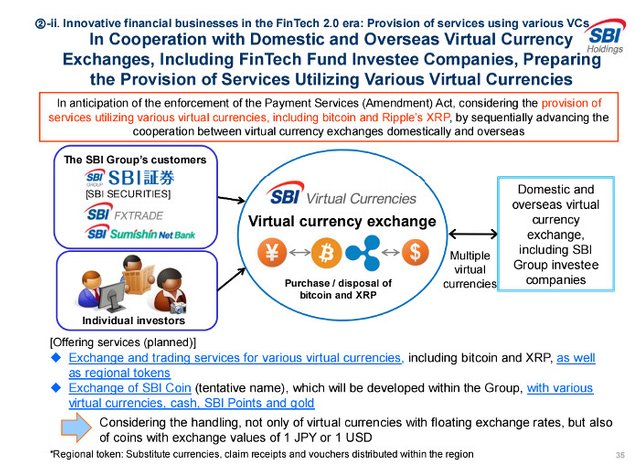
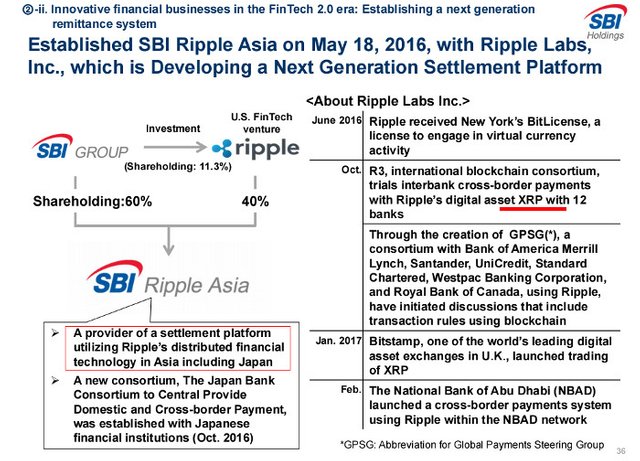
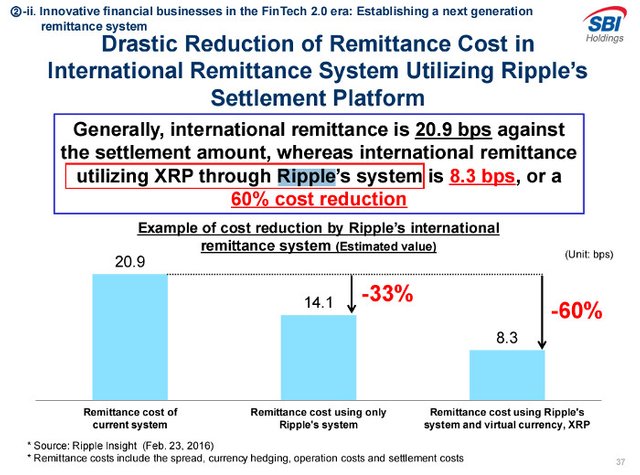
Market Cap and Value
Because XRP will still have to have enough value to accommodate the required liquidity, the amount of coins in the market cap and subsequent value are important. They will rise. The international remittance market currently moves about $5.3 trillion/day and it would be naive to think that any XRP received would be immediately sold as opposed to hanging onto it for the next outgoing transfer which will dilute supply.
And that of course is ignoring private investors and consumer uses like the XRP hedge fund announced by Micharl Arrington recently.
Major Points and XRP is already operational and undergoing extensive testing and pre-production environment usage
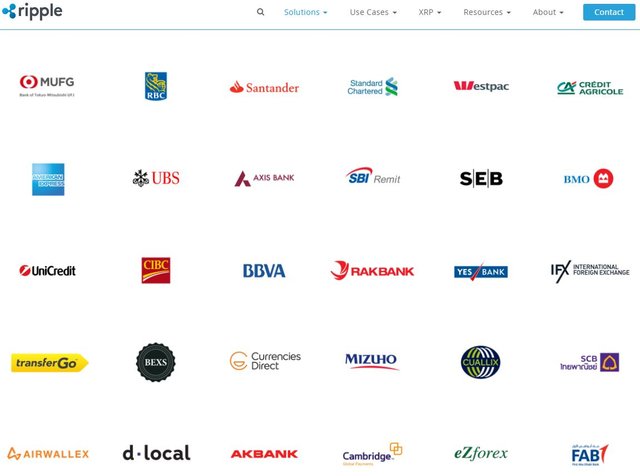
- $100+ Million in VC funding from Google, Santander, Seagate, etc.
- 200+ employees, including former SWIFT execs
- Offices in San Francisco, New York, London, Sydney, India, Singapore and Luxembourg
- Sits on Federal Reserve Task Force
- Sits on IMF Fintech Advisory Board
- SEC Registered
- ~$15 Billion in unrealized assets
- 100+ Banks testing/implementing Ripple tech
- Confirmed real world use of XRP on 10/10/17 by Cuallix
- Partnership with AMEX announced on 11/16/17
- $100 million XRP denominated hedge fund announced on 11/28/17
- % wise has outperformed all other notable cryptos including BTC in the last year
- Geared towards Enterprise and Institutions as the 1st deliverable - but then can move into the consumer space with little effort.
Ripple Escrows 55 Billion XRP for Supply Predictability
I usually explain it this way: (SJOELKATZ aka DAVID SCHWARTZ on Reddit) Improving global settlement with blockchain tech. Chief Cryptographer at Ripple; one of the original architects of the XRP network.1) There's a business that Ripple has providing transaction processing software to banks. It can work without XRP and without any blockchain tech. It improves international payments because it uses end-to-end messaging to track payment progress, ensure all necessary compliance information is in the transaction in the first place, precisely knows the fees ahead of time, and provides prompt, reliable confirmation of delivery. This is a big enough improvement that banks will use it even if the actual money moves the same way it does now.
Ripple has built a public blockchain with a native asset. It has various nice features -- a distributed exchange, good governance, fast transactions, high transaction volume, native multisign, key rotation, payment channels, and so on.
The hard part about getting banks to use a blockchain isn't the blockchain, it's everything else. It's governance, compliance, integration with banking systems, and so on. our software does all that stuff, so if routing a payment through XRP is a penny cheaper, the bank can take it. Then we have to make XRP cheaper somewhere that matters.
We don't target the biggest corridors like USD->EUR because they're efficient. We target an inefficient, but fairly high volume, corridor. For example, EUR->INR. Market makers have very small profit margins, so even a small incentive to place good EUR<->XRP and XRP<->INR offers can beat what banks are getting now through the correspondent banking system.
Once we get one corridor, we hang other countries off each end of the corridor, expanding the reach of XRP.
Now, say you're a company like Seagate that pays out money all over the globe. If you have to make payments to five countries in our corridors, you'd rather hold one pile of XRP than five piles of different currencies. That increases demand.
Now, say you're a company like Apple with a huge pile of cash. If you want to snap up other assets cheap, you'll need to hold the asset the people selling want. If they're going into any of our corridors, they'll want XRP, so you would want to hold it.
If that succeeds, it should massively increase the price of XRP.
Ripple holds a huge pile of XRP and will be the dominant XRP holder for the foreseeable future. We're VC financed and we get revenue from selling software to banks. We don't use our XRP as a bank account but as a strategic weapon. (Though we do sell some for revenue, we just don't need to for salaries or to keep the lights on.)
Anyone who gets XRP from us as part of some deal with a lockup has their incentives aligned with ours. They want the long-term price of XRP to go up too.
That gives kind of the high-level picture. As for why XRP would thrive in that environment:The use case Ripple is targeting is settling international payments, particularly in payment corridors that are not the very most popular.The idea is this: Someone wants to make a payment from Singapore to Thailand. To provide cleared funds immediately, we need to give the recipient ownership of funds that are already in Thailand, right where the recipient needs them. And, again to complete the payment immediately, we need someone to take ownership of the Singapore funds and provide the asset we use to buy the funds in Thailand.
We could do this directly, but that would mean that the payment could only be facilitated by someone who both had funds in Thailand and was willing to accept funds in Singapore. That might not be all that many people, and they might charge a lot because the market is narrow.
Enter XRP. You can have a robust market of people willing to pay XRP to get funds in Singapore. And you can have a robust market of people willing to provide funds in Thailand in exchange for XRP. Now, to make that payment, you trade on two efficient markets instead of one inefficient one.
Why XRP? Because XRP transactions can be final in just a few seconds, XRP transactions have low cost, and Ripple has put a lot of effort into optimizing XRP for this exact use case. Most importantly, Ripple is tremendously dedicated to making XRP work for this use case, and has a war chest with a notional value in the billions that it can use to make it happen.
RIPPLE IS NOT DECENTRALIZED
How We Are Further Decentralizing the XRP Ledger to Bolster Robustness for Enterprise UseSince its creation in 2012, XRP Ledger has been operating as a next-generation alternative to the proof-of-work concept that was originally introduced by Bitcoin. As the root ledger for the digital asset XRP, XRP Ledger is an enterprise blockchain supporting the institutional use case of cross-border payments, especially for banks and payments providers around the world who need more efficient liquidity and greater access to emerging markets.Decentralization of XRP Ledger is a process that started right at its inception and has been ongoing since. We intentionally haven’t rushed the process and have been making continuous progress all along. To meet the growing demands of our customers, we need to diversify the validator ecosystem to further increase resiliency and robustness. We believe these efforts will lead to XRP becoming globally adopted as the digital asset for payments.
Our strategy to further decentralize XRP Ledger consists of two components:
1. Diversify validators on XRP Ledger.
In order to maintain future network reliability and mitigate the risk of a single point of failure, XRP Ledger needs to be able to securely run without depending on any one entity. Today, XRP Ledger has 25 validator nodes running, but continuing to grow and diversify this list of recommended validator operators is a priority for us. Diversification means a variety of identities, geographic locations and software platforms, all of which will further mitigate the risk of a single point of failure.
As more validators join XRP Ledger, their performance will be monitored against a specific set of criteria, including their consensus agreement rate, uptime, verification of identity and public attestation.
2. Add attested validators to Unique Node Lists (UNLs).
A Unique Node List is the set of validating nodes that a given participant listens to for reliable information about transactions in the XRP Ledger. We sometimes call nodes that appear on many participants’ UNLs trusted. It’s these trusted nodes that validate transactions, enable/veto amendments and modify fees (learn more about validators and UNLs here). Currently, Ripple provides a default and recommended UNL configured with validating nodes operated by Ripple, and our plan is to systematically replace these nodes with attested third-party validating nodes. Over the course of the next 18 months, for every two attested third-party validating nodes that meet the objective criteria mentioned above, we will remove one validating node operated by Ripple, until no entity operates a majority of trusted nodes on the XRP Ledger.
As we continue these initiatives to further decentralize the system, XRP Ledger will inherently become even more resilient. A key benchmark that we aim to achieve is to become more decentralized than Bitcoin, which at the time of writing is 51% controlled by just five mining pools. This means the largest five pools working together could achieve a 51% attack and reverse transactions (double spend) at will. For Ethereum, this number is even lower: only three pools are needed for a takeover. To match Bitcoin, XRP Ledger would need just 16 trusted validators. Add more, and the number of tolerable faults increases accordingly. In other words, XRP Ledger will not just meet, but exceed the decentralization level of other public blockchains.
Moreover, validators on XRP Ledger will be less likely to be malicious or successfully attacked. Bitcoin chooses validators solely based on their mining power which actually disincentivizes security. Security measures cost money, but don’t improve the speed of mining. On the other hand, Ripple validators are chosen based on their merit as validators. That is to say, the most reliable, reputable, stable and secure validators will tend to appear on most people’s UNLs.
Already, Ripple is the only enterprise-ready public blockchain. Savvy enterprise services companies are running Ripple validators to demonstrate their expertise in blockchain, which will save businesses $3.1 trillion by 2030, according to Gartner. If your organization is interested in setting up a validator, you can find more information here.
COMPLIANCE
- Compliance and Risk Management on Ripple
- Compliance at Ripple Labs
- Ripple Labs Elected to Fed Steering Committee for Faster Payments
- Ripple Wiki - Compliance Resources
- 2015: Ripple Revamps Compliance Efforts, Post FinCEN Fine
- Fintech and Cross-Border Payments - By Dong He, Deputy Director, Monetary and Capital Markets - Department, IMF - Ripple – Central Bank Summit - Carnegie Hall, New York - Ripple and IMF
RIPPLE IS THE BANKS, MUH LIBERTARIANISM OF BITCOIN
- The Bitcoin Ecosystem Map.
- BCH & BTC – Central Bankers, Manipulation, the state of the landscape post 11/11/17
Where can I buy XRP?
This article is my opinion; is editorialised and does not constitute financial advice. If you have conducted your own research, due diligence, and want to buy XRP; you can get it at many places included: <iframe style="border: none; overflow: hidden;" src="https://www.facebook.com/plugins/video.php?href=https%3A%2F%2Fwww.facebook.com%2Fcnbcinternational%2Fvideos%2F1210957989005339%2F&show_text=0&width=560" width="560" height="315" frameborder="0" scrolling="no" allowfullscreen="allowfullscreen"></iframe>CNBC International was live. 15 November at 15:03 ·
Ripple (XRP) is the third-largest crypto currency. Unlike Bitcoin and Ethereum, it wants to be accepted by the banking industry and prides itself on being centralized. We spoke to Brad Garlinghouse, the CEO of Ripple to discuss how he plans to grow the private blockchain platform in this episode of #LifeHacksLive.
Next Time
There is still room in this post regulation world for Privacy Coins.... and of course; one of them is one of my favourites.
Additional Research
- Ripple Facebook Page
- GoldBug1- BTC - CME Futures - The Poison Apple is Being Served Visa Launches First Phase of Blockchain B2B Payments
- SBI unit to test cross-border blockchain funds transfers
- BIS Basel - Central bank cryptocurrencies
- JP Morgan - Market Timing Model - Methodology, Thinking Process and Strategy to time the market
- Why Is Mike Arrington Using Ripple to Fund His New $100 Million Crypto Hedge Fund?
- Bank of America Wins Patent for Crypto Exchange System
- The world’s biggest banks reportedly want to halt bitcoin futures launch
- S.1241 - Combating Money Laundering, Terrorist Financing, and Counterfeiting Act of 2017 115th Congress (2017-2018) SEC. 13. PREPAID ACCESS DEVICES, DIGITAL CURRENCIES, OR OTHER SIMILAR INSTRUMENTS.
- Commentary: The Overlooked Actor That Could Crash Bitcoin
- CME Group Announces Launch of Bitcoin Futures
- Traders at top bitcoin exchange claim they have no access to their money
- Cryptocurrency Monero To Be Accepted By Musicians Such As Mariah Carey, G-Eazy, Sia For Holidays
- South Korean Financial Regulators Ban Bitcoin Futures Trading
- SEC charges alleged cryptocurrency scam with fraudulently raising $15 million
- Man From Michigan to Serve 1 Year in Prison For Trading Bitcoin
- Ripple (XRP) – Why BTC Might Want To Start Getting a Little Terrified
- CryptoKitties Mania Overwhelms Ethereum Network's Processing
- Hedge Funds Prepare to Trade Against Bitcoin
- The Ukranian News: https://www.coindesk.com/ukrainian-central-bank-expanding-blockchain-team/Reading between the lines: http://en.interfax.com.ua/news/press-release/291803.html
- US Senate Bill S.1241 to Criminalize Concealed Ownership of Bitcoin
- CME Rival Cboe Suggests its Coming Futures Market Would Include Bitcoin Cash
- XRP: Volume Analysis and Recent News
- Comparison of Crypto Choices: XRP Against Bitcoin and Ethereum
- U.S. Congress Crackdown on Digital Currencies? FUD or For Real?
- Bitcoin 'Ought to Be Outlawed,' Economist Joseph Stiglitz Says
- Technical FAQ: XRP Ledger
- Forecast: Blockchain Business Value, Worldwide, 2017-2030
- Financial Times: What will next year bring for cryptocurrencies? Ask our banking editor and Daniel Aranda, managing director for Europe at Ripple.
- Private VPN Accepts Ripple
- The Cost-Cutting Case for Banks The ROI of Using Ripple and XRP for Global Interbank Settlements
- Building Network Effects on Ripple XRP’s Role on Ripple and in the Internet of Value
- FlashFX Uses Ripple and XRP
- TechCrunch Founder Arrington Raising $100 Million XRP Fund
- American Express, Santander team up with Ripple for cross-border payments via blockchain
Posted from my blog with SteemPress : https://hodlitbro.com.au/2017/12/09/is-it-true-that-the-house-always-wins-why-im-bullish-about-ripple-and-xrp/
